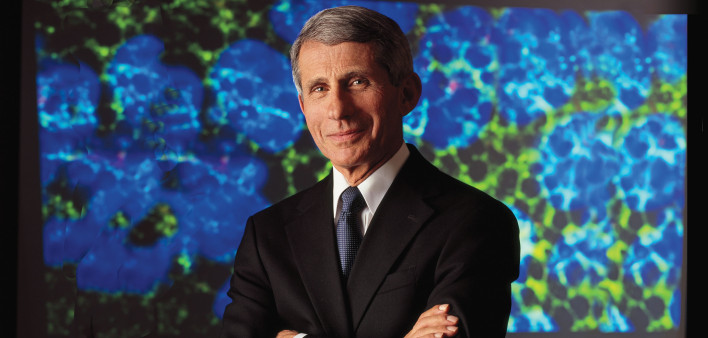Long before Anthony Fauci, MD, director of the National Institute of Allergy and Infectious Diseases (NIAID), garnered global recognition for his response to COVID-19 in the United States, he was well-known as a leader in the fight against AIDS.
As a physician-scientist in 1981, Fauci learned of a new disease emerging among gay men and gathered a team of scientists to study it.
“My whole career and life changed because I decided that this was important enough for me to change what I was doing and start pursuing this disease that didn’t even have a name at the time,” said Fauci during a 2016 NIAID interview.
When he was appointed NIAID director in 1984, Fauci continued his research, achieving several scientific breakthroughs, including a better understanding of HIV’s effect on the body’s immune system.
Fauci—who in his 36-year tenure has advised six presidents on HIV/AIDS—has used basic and applied science to prevent, diagnose and treat the virus. He also played an integral role in the development of the President’s Emergency Plan for AIDS Relief, which was launched 17 years ago.
“It’s been an extraordinary experience working with [the HIV] community,” Fauci told POZ in 2010. “Right from the beginning, it was very clear to me that there was a tremendous amount of frustration, anger, fear and pain that drove the [early] activists to be very confrontational, but I actually learned a lot from what they were saying.”
At the time, HIV activists weren’t very fond of Fauci or the federal government’s response to the epidemic. But Fauci helped broker an understanding by meeting with ACT UP members to address their concerns and hear their insights about how to further AIDS research and improve the clinical trial process.
In 2010, Fauci also told POZ he had a lot more work to do and would continue to study HIV in hopes of bettering the health outcomes of people with the virus and eventually finding a vaccine. But now, he is at the forefront of another U.S. epidemic, one that has killed more than 200,000 Americans.
As the nation’s top infectious disease expert, he has been informing the public about the novel coronavirus and the best ways to stay safe since February. As a member of the White House Coronavirus Task Force, he has also relied on science-based evidence to help shape the government’s response to the virus.
In September, Fauci sat down with HIV activist Peter Staley to discuss COVID-19, viral transmission, harm reduction and more. (You can watch the interview on Staley’s social media.)
“Oftentimes, in our concern about either scaring people or taking things out of context, we don’t say something that is reasonable and true and would be helpful if people heard it,” he said.
Both Fauci and Staley believe the coronavirus may be transmitted via aerosolized particles to some extent, but Fauci warned that this doesn’t mean a person can’t go outside. Rather, it underscores the importance of allowing air to circulate when gathering indoors by keeping windows open.
“Wear a mask, keep a distance, avoid crowds, and, importantly, outdoors is clearly better than indoors,” Fauci said. “And when indoors, [have] circulation to the extent that you possibly can.”







Comments
Comments